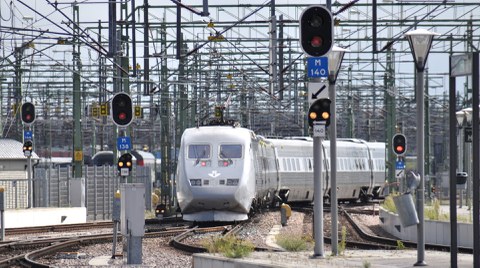22.02.2021
Zukunft des europäischen Eisenbahnsystems unter der Lupe
EU-Projekt STAFFER ermittelt zukünftigen Qualifikationsbedarf von Bahn-Fachkräften
Welche Fähigkeiten, Kenntnisse und Qualifikationen benötigen (Nachwuchs-)Fachkräfte in den Branchen und Berufen von morgen? Die Suche nach einer Antwort gleicht oftmals einem Blick in die Glaskugel – muss es aber nicht. Denn es geht auch ganz praktisch. Um für den europäischen Bahn- und Schienensektor eine Blueprint-Strategie zu entwickeln, die den aktuellen und zukünftigen Qualifikationsbedarf der Bahn-Fachkräfte und -Spezialisten identifiziert, hat sich Ende 2020 ein Konsortium von 32 Partnern aus der gesamten Europäischen Union und ihrer Bahngemeinschaft zusammengeschlossen. Im Projekt „Skill Training Alliance For the Future European Rail System“ – kurz STAFFER – sollen zudem in Kooperation mit der Industrie und den Berufsbildungseinrichtungen konkrete Schulungs- und Ausbildungspläne entworfen werden, um die Beschäftigungsfähigkeit und die Karrieremöglichkeiten im europäischen Bahn- und Schienensektor zu verbessern.
Fakultät Verkehrswissenschaften bringt Wissen ein – und möchte Erkenntnisse nutzen
Unter den 32 Partnern im auf vier Jahre angelegten STAFFER-Projekt ist auch die TU Dresden, vertreten durch die Professur für Verkehrssicherungstechnik an der Fakultät Verkehrswissenschaften „Friedrich List“. Der Leiter der Professur, Prof. Jochen Trinckauf, sagt: „Forschung und Lehre rund um Bahnsysteme, Bahntechnik und Bahnfahrzeuge haben an der Fakultät Verkehrswissenschaften eine lange Tradition. Seit Jahrzehnten werden bei uns global gefragte Spezialisten und Fachkräfte für den Schienen- und Bahnsektor und alle daran angebundenen Bereiche ausgebildet. Mit unserer Lehre waren wir stets am Puls der Zeit und wollen dies auch bleiben. Deshalb ist eine Beteiligung an dem Projekt STAFFER von großer Bedeutung für uns – sei es, um unser Wissen einzubringen, aber auch um die neuen Erkenntnisse für unsere Lehre und Studiengänge zu nutzen.“
Karriere im Eisenbahnsektor? TU Dresden an zwei Arbeitspaketen beteiligt
Innerhalb der neun definierten Arbeitspakete in STAFFER bringt sich das Projektteam der Fakultät Verkehrswissenschaften „Friedrich List“ insbesondere bei der „Ermittlung aktueller und künftiger Fähigkeiten und Kompetenzbedarfe“ aus technischer, organisatorischer und betriebswirtschaftlicher Sicht ein. „Außerdem wirkt das TUD-Team an der Erarbeitung einer Strategie und eines Aktionsplanes mit, um die Attraktivität des Eisenbahnsektors als Karriereweg zu steigern (,Making the rail sector a great place to work‘)“, erklärt Dr. Elena Queck, die das Projekt innerhalb der Fakultät Verkehrswissenschaften „Friedrich List“ betreut.
Projekt als ein wichtiger Baustein zum Erreichen der Ziele des „Green Deal“ der EU
Die Schiene ist ein wichtiger Motor für das strategische europäische Ziel eines intelligenten, grünen und nachhaltigen Wirtschaftswachstums. Mit einem Anteil von weniger als 2 Prozent am End-Energieverbrauch im Verkehr wird die Schiene das Rückgrat des umweltfreundlichen europäischen Verkehrssystems von morgen sein. Allerdings leidet der Sektor derzeit unter einem gravierenden Fachkräftemangel. Zudem wird ein großer Teil der Belegschaft in den nächsten 10 Jahren in den Ruhestand gehen, während gleichzeitig die technologischen Entwicklungen ein höheres Qualifikationsniveau erfordern. Um auf die Bedeutung von Bahn und Schiene aufmerksam zu machen, hat die EU das Jahr 2021 zum „Europäischen Jahr der Schiene“ ausgerufen.
„Auf Basis der Ergebnisse aus dem STAFFER-Projekt sollen u. a. Studiengänge überarbeitet, europaweite Mobilitätsprogramme eingerichtet und arbeitsbezogene Praktika für Studierende, Auszubildende und Mitarbeitende geschaffen werden. STAFFER möchte Lösungen für das Humankapital auf allen Ebenen der Wertschöpfungskette der Bahn liefern, die sowohl die Bedürfnisse der Zulieferindustrie als auch die der Bahnbetreiber abdecken“, so Elena Queck. „In STAFFER geht es um die Stärkung des Verkehrssystems Eisenbahn im europäischen Kontext. Mit den Talenten, die sie braucht, um den grünen wie auch digitalen Wandel zu bewältigen, wird der Sektor in der Lage sein, mehr und verbesserte Produkte und Dienstleistungen anzubieten. Als solches ist das Projekt ein wichtiger Baustein zum Erreichen der Ziele des Green Deal der EU.“
Ansprechpartnerin zum Projekt an der TU Dresden, Fakultät Verkehrswissenschaften "Friedrich List":
Dr.-Ing. Elena Queck
Professur für Verkehrssicherungstechnik
E-Mail:
Über das STAFFER-Projekt:
Das innereuropäische Projekt Skill Training Alliance For the Future European Rail System (STAFFER) ist auf vier Jahre angelegt. Das Konsortium aus 32 Projektpartnern hat sich zum Ziel gesetzt, eine ganzheitliche Strategie zu erarbeiten, die den aktuellen und zukünftigen Qualifikationsbedarf identifiziert und damit zur Weiterentwicklung von Studiengängen im Eisenbahnwesen beiträgt. Um den erforderlichen Qualifikationsbedarf zu ermitteln und die Zusammenarbeit zu verbessern, sind unter den 32 Projektpartnern auch Interessenvertreter der Industrie wie Siemens und Deutsche Bahn. Die Leitung obliegt der Universität Genua (Italien). STAFFER wird durch das Erasmus+ Programm der Europäischen Union unter der Leitung der Generaldirektion Bildung, Jugend, Sport und Kultur (DG EAC) finanziert. Das ERASMUS+ Programm dient der Förderung von allgemeiner und beruflicher Bildung, Sport und Jugend in Europa. Im Hochschulbereich stehen nicht nur Auslandssemester für Studierende im Fokus, sondern auch das Hochschulpersonal und Kooperationen von Universitäten mit inner- und außereuropäischen Partnern.


